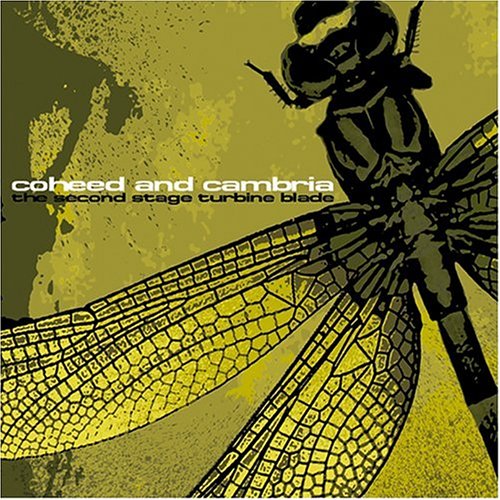Killer Klassix: Coheed And Cambria– “The Second Stage Turbine Blade”
“The Second Stage Turbine Blade” is a search for an other-worldly melody that transcends the medium.

November 14, 2022
As an artist and realist, I truly believe love is the only form of true, ancient magic that remains on the planet. Love is free of divinity and capable of performing some of the most astounding changes within individuals as well as causing the most profound cataclysms. Concentrating all those emotions, events and tragedies into a single, linear space opera is a large undertaking, even without adding the element of musical lyricism. Yet, New York natives Coheed and Cambria did exactly that. On the cusp of the celebratory tour of their second album, it’s worth revisiting the beginning.
“The Second Stage Turbine Blade”was the first album by Post-Hardcore quintet, Coheed and Cambria. Released March 5, 2002 by Equal Vision Records, “The Second Stage Turbine Blade” initiates the dramatic space opera story of Coheed and Cambria, the titular stand-in for both the band name and the story. Coheed and Cambria are a fictional couple who seek connection in a world that has doomed them to separation by means of a lethal injection of a virus capable of destroying the universe. “The Second Stage Turbine Blade” is an immersive science fiction exploration of being together while destroying worlds they know so well.
Our drama begins with “Time Consumer,” enticing the listener with a slow-paced, ominous melody that ensnares the listener in the tale. Vocalist/lyricist/ and rhythm guitarist Claudio Sanchez leads the track in both melody and harmony, aligning his musical contributions over a progressive build and surprising snap into a new melody.
The track then morphs into a more energetic, punk track with experimental guitar riffs, highlighting some of the more artistic aspects of Sanchez’ composition. Sanchez’s vocals switch from a whisper sing to a passionate investment to demand his listener’s attention with heavy emphasis on melody. “Debate to understand that we all have a flaw/Then fail to represent your life as you know it/God grant you one wish, to turn back the time/Correct and create, making sense of…” as means of humanizing his story, highlighting our desire to change the things that form us and unknowingly preventing the pain that enabled us to learn in the first place. Though the lyrics for most of Coheed and Cambria’s songs are not explicit, they enable the listener to take the alternate reality and apply it to their own.
“Devil In Jersey City” acts as both a title and the only explanation for the story. For this track, Sanchez begins by childishly laughing and saying “Shabutie,” a nod to his previous band. The track progresses with pop punk-fused rhythms and hardcore breakdowns. As fun and energetic as the track may present itself, it tells the tale of a band of adolescent demons who scream and rejoice in the brutal attack and assault of a couple. The chorus is masterful, a verbal iteration of the antagonistic sayings of the ethereal assailants. Sanchez’s bridge sings “Don’t let them scare you/When you’re down on the floor bleeding bastard/You’ll be getting home real soon/And I’ll pray for you high health/Don’t let them scare you/When you’re down on the floor bleeding bastard/You’ll be getting home real soon.” Ultimately the track is heard as a human exploration of the bystander effect, the residual consequences and in this case, impactful effects on society.
“Delirium Trigger” is dramatic and soul-sucking, a reflection of the dark mystery of space. It harkens back to the infamous chest-burster scene from 1979 sci-fi/horror film, “Alien.” However, Sanchez has his own message. The track is an exploration of the loss of self and innocence. The tune creeps inside you.
The opening, beautifully reminiscent of a lullaby, is disrupted by distorted guitars before Sanchez’s narrative sets the dramatic scene. The drums provide the frame for the story as the guitars only transcend to the physicality of the lyrics. Sanchez’s lyrics read “Sit up, right on the table/A photograph of earth feeding me a way back/Frightened, I tear alone/Or maybe not the the only one there/”Hello?”… “Hello”/When it rings, will you answer?/There, corner tall short stance, it’s you/Come on, kill me.” Sanchez crafts a story that demonstrates the human transformation from youth to adult, articulating the brutal nature with which we let go of formative interests and take on responsibility, which ultimately leaves us empty.
Science fiction and fantasy fans will appreciate the cinematic descriptions and undertones, while punk fans and music listeners will appreciate the constant search for a melody. “The Second Stage Turbine Blade” is art that transcends its medium. Though we are 20 years out, the album still exemplifies the best combinations of music and whimsical story-telling.
5/5



















